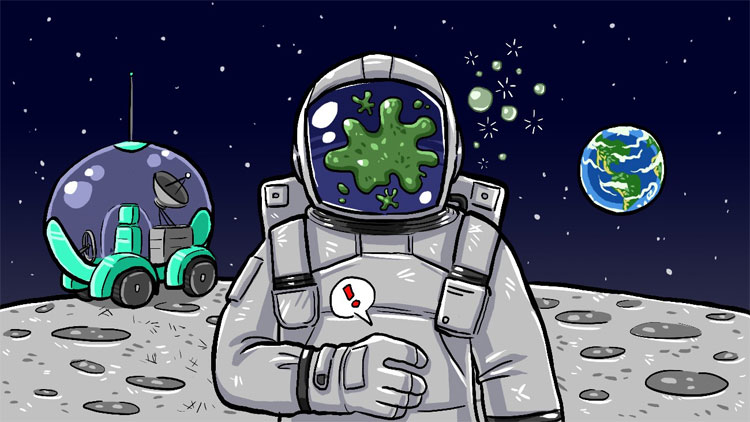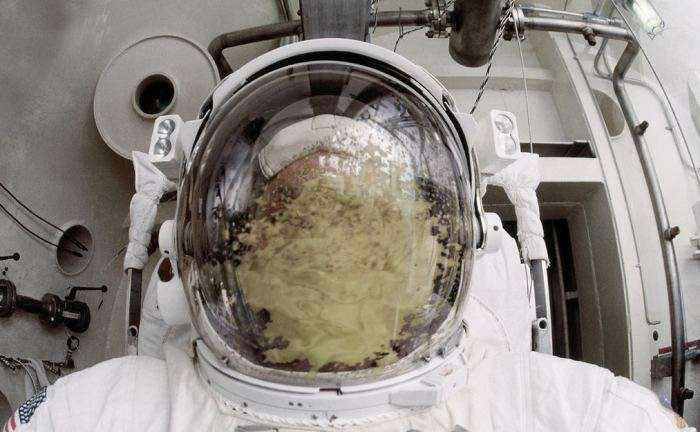In a zero gravity environment, do astronauts get sick easily?
The difference between the two different environments will lead to a series of body changes and pathogens.
Becoming an astronaut is not an easy thing when candidates have to go through a process of training and testing for months on the ground.

67 to 75% of astronauts suffer from Spatial Syndrome.
After that, physical and skill tests are given to determine if they can participate in the upcoming space trip. This demonstrates that the astronauts have been assured the best health when stepping on the spacecraft.
However, what will happen to the astronaut's body when in a gravityless environment? Like they can get sick while on the spacecraft?
Zero gravity - the terror threatens the health of astronauts
According to a report from the NASA Center, about 67 to 75% of astronauts have acquired Space adaptation syndrome (SAS) while they are traveling on spacecraft.

Vomiting - one of the common signs in SAS syndrome.
This is due to the fact that in a zero gravity environment, sudden differential pressure - temporary fluid retention of organs in the body, especially mucus (mucus) in the sinus cavity (sinus) stuck.
This causes a series of symptoms such as nausea, headache, sneezing and vomiting that occur as soon as they leave Earth. A few days later, their bodies gradually adapted.
And yet, the human immune system in this environment is also weak. Partly because the body reduces fluid cells such as T-cells that help fight inflammation or macrophages help "defeat" harmful bacteria.
As for pathogens, according to NASA's pathological research results published in TIME magazine: In a zero gravity environment, cell membranes (cell walls) of bacteria will be strengthened, causing them to resist against air pressure.

The risk of astronaut's disease still exists at a certain rate.
"We know that moisture has a huge impact on pathogenic bacteria. With harsh environments like in space, bacteria must also find ways to" adapt "to survive" - Dr Leonard Mermels belongs Rhode Island hospital said.
Therefore, the risk of astronaut disease still exists a certain percentage. When health is somewhat diminished, pathogens are still "traveling" in space, it is difficult for anyone to say anything.
Therefore, prevention of disease is very important for astronauts. A series of checks on the ship's sterile condition or food are carefully screened to ensure before takeoff.
During the journey, a doctor will always be on the ground if the astronaut has health problems. Through the message that was transferred from the spacecraft to ISS (International Space Station), the doctor will provide guidance, advice and reassurance to the astronauts.
So, don't think that outside the pillar, the germs on Earth will disappear, just that they "hide their faces" .
- How do astronauts eat when things hang on?
- Mysterious syndrome weakens astronauts' eyesight
- After being in outer space, how do astronauts change when they return to Earth?
- MIT fabricates silk guns to move in non-gravity space
- How do astronauts cry in the universe?
- Thinking you sick will make you sick
- How do astronauts use the toilet in space?
- Develop a sticking tool on the universe inspired by gecko feet
- Telemetron - Musical instruments are designed to play in a zero gravity environment
- Russian astronauts practice landing on the Moon
- Gravity, gravity and things we still think
- The scientific world when it comes to finding the
 Van Allen's belt and evidence that the Apollo 11 mission to the Moon was myth
Van Allen's belt and evidence that the Apollo 11 mission to the Moon was myth The levels of civilization in the universe (Kardashev scale)
The levels of civilization in the universe (Kardashev scale) Today Mars, the sun and the Earth are aligned
Today Mars, the sun and the Earth are aligned The Amazon owner announced a secret plan to build a space base for thousands of people
The Amazon owner announced a secret plan to build a space base for thousands of people